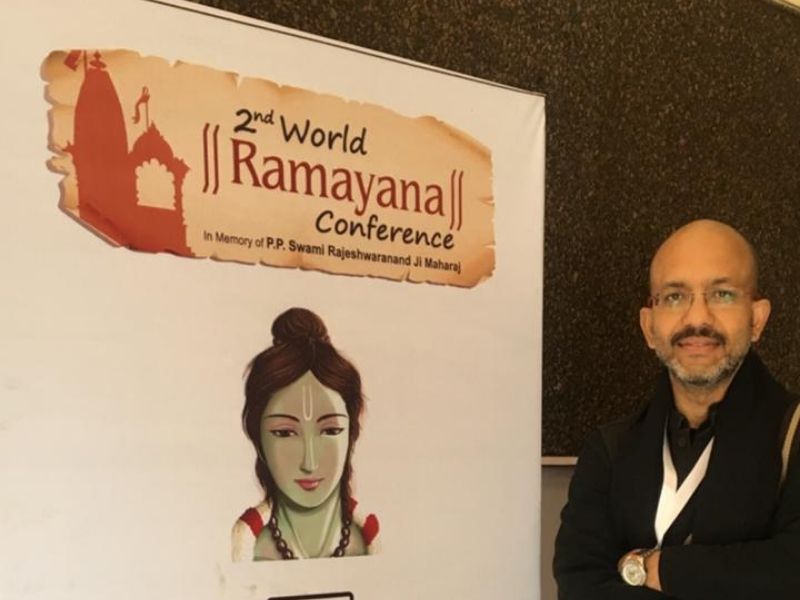The Ramayana School (estb.2020), an online platform focusing on learning life skills has already had 2500 participants from over 22 countries attending its workshops designed around stories based on characters from the Ramayana and other Indian scriptures. Shantanu Gupta, Founder and CEO talks to Dipta Joshi of EducationWorld about the need to add pedagogy and modern learning techniques to Indian scriptures to ensure holistic development.
Q) Explain the Ramayana School’s tagline, “Learn morals before math and character before coding”?
As parents, we want our children to be successful but if we are to ensure holistic development of our children, we must teach them to take tough decisions and handle anxiety while adhering to good values. In a normal classroom, we only challenge children with questions related to Math or Science and not moral and critical thinking questions. The Ramayana School focuses on the critical thinking of children with a lot of deliberation, debates and counter-debates. The Ramayana School offers life lessons plus a lot of online tools and games focusing on creativity, communication, collaboration.
The fact that Ramayana has survived over the years and is popular across countries shows that there is a lot to learn from it and its characters – Rama, Sita, Lakshman, Jatayu and even Ravana. I added three layers to this idea of teaching children life skills based on the scriptures and launched the Ramayana School last April 2020 during the lockdown.
For a start, the story of Ramayana is broken into 20-25 lessons. The second layer teaches decision-making and enhances leadership skills since it applies those lessons in real-life situations. For example, we ask participating children if they would mind breaking the traffic rules if they were running late to catch a flight? Students’ answers are then juxtaposed with how leaders like Rama, Jatayu or Dashratha behaved in a crisis situation. Thus children learn how a leader ought to be. As a third layer, we introduce the four C’s – creativity, communication, collaboration and critical thinking through customised activities.
Q) The website indicates programmes can be taken up by schools as well as individuals. How does it work?
A) We started the programme for children in the 7-14 years age group, but have moved on to introducing courses for adults too. The topics and level of debate differ depending on the age group, gender and country. We conduct customised workshops with well-trained experts for younger children (age group 7-14 years) and young adults (15+ years).
Participants are given a login to our syllabus system which has 50-60 puzzles and games around creative thinking and Ramayana. Other products include games about Hanuman or Shloka chanting. All products are designed to add a layer of critical thinking to the lessons learnt from the scriptures. Children are asked about characters they relate to and what they would like to imbibe from that character. We have a workshop tool called ‘Kill the Ravana within you’ which is about getting rid of a habit or trait that has been holding them (the participant) back.
Q)How have you integrated technology into these teachings?
A) We have a learning management system (LMS) based on Moodle. For our live classes, we use interactive tools like Mentimeter.com. etc. that allow me to access the answers written by the participating students and counter-question them about it. We have designed many such workshop tools and one such tool is ‘Kill the Ravana within you’. For the home assignment, we have a lot of activities like crossword puzzles, jigsaw puzzles, puppet making, and children make their animations based on the Ramayana which we upload on our YouTube channel.
Q)What segment of online learning would you place yourself in and who are you competing with?
A)We are definitely in a new segment but since children don’t have infinite time after school and we also charge money, on one level we are competing with every other online educator. While our direct competition is with the ones who provide life skills learning, our emphasis is on learning through the Indian scriptures. I believe our main competition is the Amar Chitra Katha which publishes children’s books and comics around Indian scriptures. However, they have no pedagogy around it and simply convey the story. We have added a layer of structured pedagogy around these stories making children dive deep into it and learning leadership lessons, decision making and many more life skills through it. Presenting Indian scriptures in a modern learning technique is our idea.
Q) What kind of response have you received so far?
A) The response has been very positive. We have tied up with the Raisoni Group of schools in Maharashtra, the Mumbai-based Singapore International School, and Iris Florets in Andhra Pradesh has done a workshop with us. Apart from the 2,500 children from 22 countries that have done our workshops based on the Ramayana, Shlokas and Hanuman, we have now tied up with the Hindu University of America in Florida. We are providing them with a full-fledged thirty hours credit course on their platform for adults around the Ramayana.
Q) How do you intend to scale up your offerings?
We will continue using the B2B (business to business) route and the B2C (business to consumers) route to reach out to more learners. We are in the process of raising money to reach the next level in our journey so that we can expand horizontally as well as vertically.
The idea is to have many more courses and add a lot of contemporary history to our repertoire. Once we cover ancient history like the Ramayana, the Mahabharata, the Gita, various Darshans, stories from the Panchatantra, etc., we will introduce leadership lessons from the lives of Indian leaders like the Rani of Jhansi or Shivaji Maharaj. It has also been very heartening to know that the Madhya Pradesh Government is keen on engaging students with the Ramayana and Mahabharata texts in its engineering colleges.
